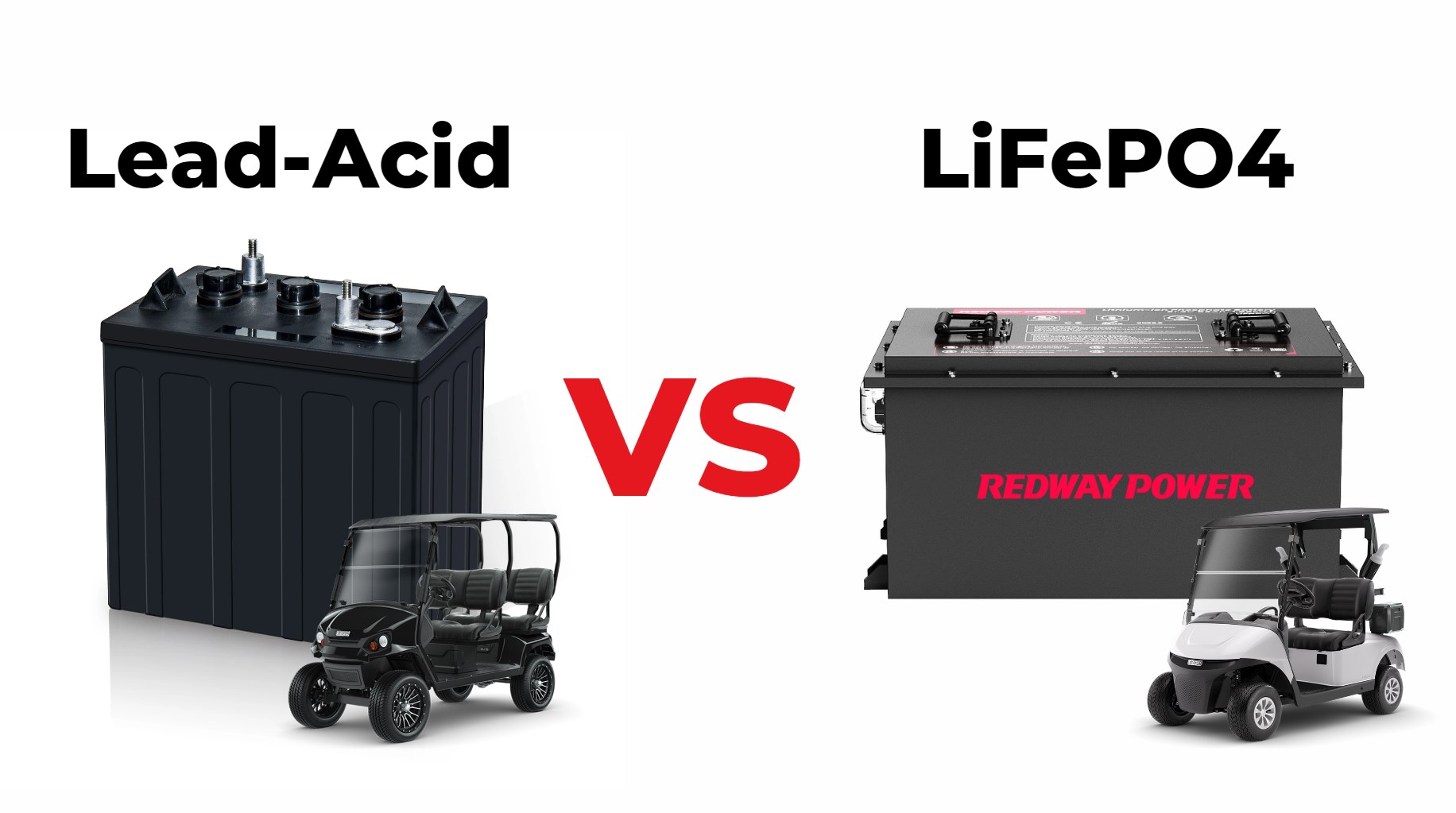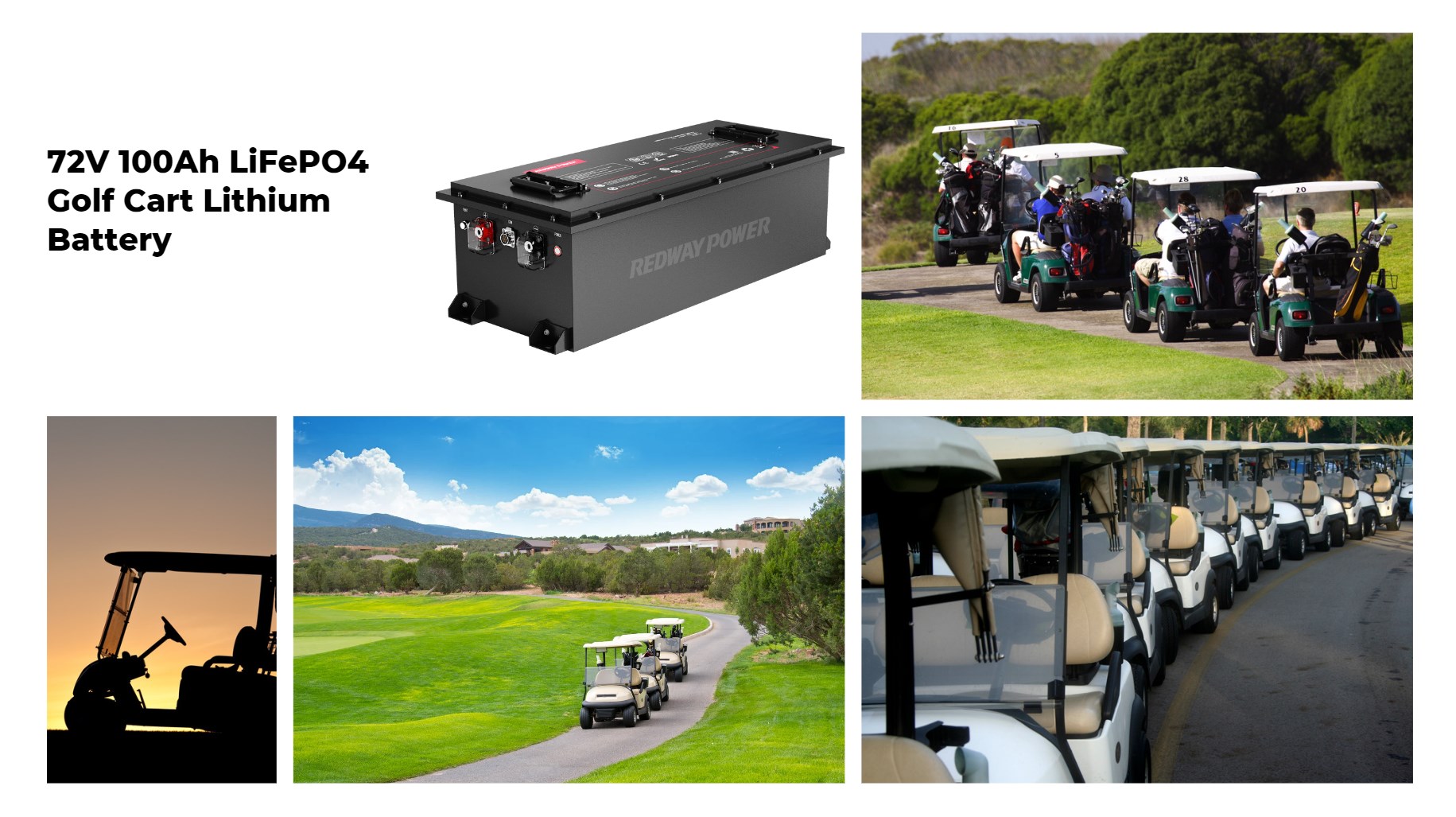When it comes to enhancing the performance and efficiency of golf carts, understanding the weight differences between LiFePO4 (Lithium Iron Phosphate) batteries and traditional lead-acid batteries is crucial. At Redway Battery, a leading manufacturer specializing in LiFePO4 batteries for golf carts, we delve into the specifics of how these weight differences can impact your golf cart’s speed, handling, and overall performance.
LiFePO4 golf cart batteries are lighter than lead-acid ones; a lead-acid battery typically weighs 60-70 pounds, while a similar LiFePO4 battery weighs around 30-40 pounds. This weight reduction enhances handling and efficiency in your golf cart.
Weight Comparison: LiFePO4 vs. Lead-Acid Batteries
1. Lead-Acid Battery Weights
Traditional lead-acid batteries, which have been the industry standard for many years, are known for their heavy weight. A standard golf cart lead-acid battery typically weighs around 60 to 70 pounds (27 to 32 kg). Depending on the configuration and the specific model, some larger lead-acid batteries can even exceed this weight, especially when considering deep cycle models designed for prolonged use. This significant weight can influence the overall performance of the golf cart, affecting its speed, acceleration, and handling.
Wholesale lithium golf cart batteries with 10-year life? Check here.
2. LiFePO4 Battery Weights
In contrast, LiFePO4 batteries offer a more lightweight alternative. A comparable LiFePO4 golf cart battery generally weighs between 30 to 50 pounds (14 to 23 kg). This remarkable reduction in weight results from the advanced chemistry and design of LiFePO4 technology, which allows for a higher energy density. By using lighter materials, manufacturers can create batteries that deliver equivalent power and capacity without the excessive weight associated with lead-acid batteries.
3. Weight Reduction Impact
The difference in weight can result in a total reduction of up to 40% or more when switching from lead-acid to LiFePO4 batteries in a golf cart. For example, a typical golf cart that operates on six lead-acid batteries (each weighing around 60 pounds) could weigh 360 pounds just in batteries alone. By replacing these with LiFePO4 batteries, the total weight could drop to as little as 180 pounds. This reduction significantly enhances the cart’s agility, making it easier to maneuver and improving the overall driving experience.
Want OEM lithium forklift batteries at wholesale prices? Check here.
Advantages of Lighter Batteries in Golf Carts
1. Improved Acceleration and Speed
The lighter weight of LiFePO4 batteries directly contributes to better acceleration and speed. With less weight to move, golf carts can achieve higher speeds more efficiently. This improvement is especially beneficial in hilly terrains where acceleration can be sluggish with heavier lead-acid batteries. The increased responsiveness provided by a lighter battery can lead to a more enjoyable and dynamic riding experience.
2. Enhanced Handling and Stability
Reducing the weight of the batteries lowers the center of gravity in the golf cart, which enhances stability during turns and maneuvers. Golf carts equipped with LiFePO4 batteries benefit from improved handling, making them safer and easier to drive. This is particularly important for golfers navigating tight spaces or uneven terrains on the course.
3. Extended Range and Battery Life
LiFePO4 batteries not only weigh less, but they also offer higher energy density. This means they can store more energy in a smaller, lighter package, leading to extended range. Golf carts with LiFePO4 batteries can travel longer distances on a single charge compared to those with lead-acid batteries. Additionally, the longevity of LiFePO4 batteries—often exceeding 10 years—provides long-term savings in both performance and maintenance.
Considerations for Golf Cart Owners
1. Initial Cost vs. Long-Term Savings
While LiFePO4 batteries are generally more expensive upfront compared to lead-acid alternatives, their longevity and reduced maintenance requirements can lead to substantial savings over time. Golf cart owners must weigh the initial investment against the potential benefits of improved performance and reduced long-term costs.
2. Compatibility and Charging Requirements
Switching to LiFePO4 batteries may require adjustments to existing golf cart systems, including chargers. Golf carts need to be equipped with appropriate charging solutions designed for LiFePO4 technology to maximize performance and lifespan. Our team at Redway Battery provides expert guidance on compatibility and offers custom lithium battery solutions tailored to your specific golf cart model.
Latest News
- Weight Comparisons: Recent analyses highlight that LiFePO4 golf cart batteries are substantially lighter than lead-acid alternatives, often weighing up to 70% less.
- User Preferences: The reduced weight makes handling easier and improves vehicle efficiency.
- Market Insights: Increased consumer awareness about weight advantages is driving demand for lithium options over traditional lead-acid batteries.
Redway Expert Comment
The significant weight difference between LiFePO4 and lead-acid golf cart batteries cannot be overstated; lighter batteries enhance vehicle handling and overall efficiency. This advantage makes lithium options increasingly attractive for consumers seeking improved performance without sacrificing power. As an expert in this field, I strongly advocate for considering weight as a key factor when selecting battery types for golf carts.
Conclusion
The weight differences between LiFePO4 and lead-acid batteries have significant implications for golf cart performance. The lighter LiFePO4 batteries not only enhance speed and acceleration but also improve handling and stability, making them a superior choice for modern golf carts. At Redway Battery, we specialize in custom lithium golf cart battery solutions that deliver outstanding performance and reliability.
If you are considering upgrading your golf cart’s battery system, contact us for a quick quote and discover how our LiFePO4 batteries can enhance your golfing experience!
FAQs
How does the weight difference between LiFePO4 and lead-acid batteries impact golf cart performance?
LiFePO4 batteries are significantly lighter than lead-acid batteries, often weighing 50-60% less. This weight reduction enhances golf cart performance by improving handling, increasing speed, and allowing for a higher carrying capacity without compromising stability. The lighter load also contributes to better energy efficiency, enabling longer driving ranges.What are the maintenance requirements for LiFePO4 batteries compared to lead-acid batteries?
LiFePO4 batteries require minimal maintenance compared to lead-acid batteries, which need regular checks for water levels and equalization charging. LiFePO4 batteries do not require topping up with distilled water and have built-in safety features that reduce the need for frequent monitoring, making them more user-friendly.How does the charging time of LiFePO4 batteries affect their overall efficiency?
LiFePO4 batteries can be charged fully in 1-2 hours, significantly faster than the 6-8 hours required for lead-acid batteries. This rapid charging capability minimizes downtime and allows for more efficient use of the golf cart, as users can quickly recharge during breaks or short stops.Are LiFePO4 batteries more cost-effective in the long run compared to lead-acid batteries?
Yes, while LiFePO4 batteries have a higher initial cost, their longer lifespan (up to 10 times more cycles than lead-acid) and lower maintenance needs make them more cost-effective over time. Reduced replacement frequency and energy savings contribute to overall lower lifetime costs.What are the environmental benefits of using LiFePO4 batteries over lead-acid batteries?
LiFePO4 batteries are more environmentally friendly as they do not contain toxic materials like lead. They have a longer lifespan, which reduces waste from frequent replacements. Additionally, their efficient charging reduces energy consumption, contributing to a lower overall carbon footprint compared to lead-acid batteries.







